- Home
- Ken Follett
The Evening and the Morning Page 25
The Evening and the Morning Read online
Page 25
This was the moment of final decision.
Edgar sat upright, and Dreng moved.
Edgar lay back down.
Dreng stopped snoring, turned over, breathed normally for a minute, then scrambled to his feet. He picked up a cup, filled it from the water bucket, drank, and went back to his place on the floor.
After a while he resumed snoring.
There will never be a better time, Edgar thought. He sat up. Blod did the same.
They both stood up. Edgar’s hearing was alert for any change in the sound made by the sleepers. He lifted his ax off its hook, stepped softly to the door, and glanced back.
Blod had not followed him. She was bending over Dreng. Edgar felt a flash of panic: was she going to kill her tormentor? Did she think she could silently slit his throat and walk away? That would make Edgar a murderer’s accomplice.
In the rushes beside Dreng lay his belt with its attached sheath containing his dagger. It was what he used for general purposes, including to cut up his meat, but it was longer and sharper than Blod’s. Edgar stopped breathing. Blod quietly slid the blade out of the sheath, and Edgar felt sure she was about to stab the killer of her child. She straightened up with the knife in her hand. Then she twisted the hilt of the dagger into the cord she used as a belt and turned toward the door.
Edgar suppressed a grunt of relief.
He guessed that Blod had stolen Dreng’s dagger as a precaution in case she should meet dangerous men during her nighttime travels—a situation in which her own little knife would be of little use.
He opened the door slowly. It creaked, but not loudly.
He held it for Blod and she passed through, followed by Brindle. Fortunately the dog was intelligent enough to know when to be quiet.
Edgar glanced at the sleepers one last time. To his horror, he saw that Ethel’s eyes were wide open and she was watching him. His heart seemed to stop.
He stared at her. What would she do? For a long moment both were frozen. Perhaps she was working up the courage to yell a warning and wake Dreng.
But she did nothing.
Edgar stepped out and closed the door softly behind him.
He stood still and quiet outside, waiting for the shout of alarm, but all he heard was the quiet flow of the river. Ethel had decided to let them go. Once again Edgar slumped with relief.
He slung his ax from his belt.
The sky was partly overcast, and the moon peeped from behind a cloud. The river gleamed, but the hamlet was sunk in gloom. Edgar and Blod walked up the hill between the houses. Edgar feared that a dog would hear them and bark, but nothing happened: the village hounds probably recognized their steps, or smelled Brindle, or both. For whatever reason, they decided that no alarm was necessary.
As Edgar and Blod passed the church, Blod turned into the churchyard. Edgar was alarmed. What was she up to?
The grass had not yet grown over the grave of her child. On the turned earth, a pattern of smooth stones formed a cross, something Blod must have done herself. She knelt at the foot of the cross with her hands folded in prayer, and Edgar did the same.
Out of the corner of his eye, Edgar saw someone step out of the priest’s house.
He touched Blod’s arm to warn her. It was Father Deorwin, he saw. The old man stumbled a few yards then lifted the skirt of his robe. He and Blod froze in position. They were not invisible by any means, but he had to hope that they faded sufficiently into the darkness to elude an old man’s eyesight.
Like all children, Edgar had been taught that it was bad manners to stare at someone relieving himself, but now he watched Deorwin warily, praying that the old man would not raise his gaze. However, Deorwin was intent on what he was doing, and had no interest in looking around the hamlet as it slept in darkness. Finally he dropped his robe and slowly turned. For a moment his face was toward Edgar and Blod, and Edgar tensed, waiting for a reaction; but Deorwin seemed not to see them, and went back inside.
They went on, grateful for an old man’s poor eyesight.
They continued to the top of the rise. On the ridge the road forked. Blod was heading northwest, toward Trench.
Blod said: “Good-bye, Edgar.” She looked sad. She should have been happy: she was running away to freedom.
“Good luck,” said Edgar.
“I will never see you again.”
I hope not, Edgar thought; if we meet again it will mean you have been caught. He said: “Give my regards to Brioc and Eleri.”
“You remembered my parents’ names!”
He shrugged. “I liked the sound of them.”
“They’re going to hear all about you.” She kissed his cheek. “You’ve been a friend to me,” she said. “The only one.”
All he had done was treat her like a human being. “It wasn’t much.”
“It was everything.” She put her arms around him, laid her head on his shoulder, and hugged him hard. She rarely showed emotion, and the passion in her hug surprised him.
She released him and, without speaking again, she walked away along the road. She did not look back.
He watched her until she was out of sight.
He returned down the hill, still treading softly. It seemed no one else was awake. That was good: if he were seen now he could offer no possible excuse. A slave had escaped, and Edgar was up and walking around in the middle of the night: his complicity was undeniable. The consequences of that hardly bore thinking about.
He was tempted to reenter the alehouse and lie down in cozy safety, but he had promised to lay a false trail for Blod.
He went to the riverbank and untied the ferry. Brindle jumped in. Edgar boarded and quietly picked up the pole.
It needed only one thrust to push the ferry out into the current. The flow of water took the vessel around the north side of Leper Island. Edgar deployed the pole to keep away from the banks on both sides.
He floated past the farm. Erman and Eadbald had ploughed the field, and the moon shone on damp furrows. No light showed from the house, not even firelight, for there was no window.
The current was fastest a little to the right of midstream. Brindle stood at attention in the bow, sniffing the air, ears cocked for any sound. They passed through thick woodland interspersed with villages and single-family settlements. An owl hooted, and Brindle growled.
After an hour Edgar began to study the left bank, looking for a suitable place to leave the ferry. He needed a location where the boat might have got tangled in riverside vegetation so badly that a small, thin girl could not extricate it. He had to fake evidence that would tell a plain, clear story. If there was the least flaw then suspicion would immediately fall on him. There must be no room for doubt.
The place he chose was a small patch of shingle overhung by drooping trees and bushes. He poled to the bank and jumped. With an effort he hauled the heavy boat partly out of the water and pushed it into the vegetation.
He stepped back to study the picture he had created. It looked exactly as if an inexperienced person had lost control and allowed the boat to become entangled and beach itself.
His work was done. Now he had to walk back.
First he needed to cross the river. He took off his tunic and shoes and made a bundle of them. He stepped into the river, holding his clothes above his head with one hand to keep them dry, and swam across. On the other side he dressed quickly, shivering, while Brindle energetically shook herself dry.
Side by side, Edgar and his dog started to walk home.
The forest was not empty of people. However, even Ironface should be asleep now. If anyone was awake and moving nearby, Brindle would give warning. All the same, Edgar drew his ax from his belt, to be ready for anything.
Would his ruse work? Would Dreng and the other residents of the hamlet make the false deduction Edgar was trying to lead them to? Suddenly he could
not judge how plausible the whole deception was. Doubts tortured him: he could hardly bear the thought of Blod being recaptured, after all she had been through.
He passed Theodberht Clubfoot’s sheepfold, and Theodberht’s dog barked. He suffered a moment of anxiety: if Theodberht saw him, the deception would lose all credibility. He hurried on, and the dog quieted. No one came out of the house.
Walking along the bank, occasionally having to fight through vegetation, he found that progress was slower than when on the ferry, and it took him almost two hours to get back. The moon set as he was passing the farm, and the stars were obscured by cloud, so he did the last stretch in thick darkness.
He made his way to the alehouse by memory and feel. Now came the final moment of danger. He paused outside the door, listening. The only sounds from inside were snores. He lifted the latch gently and pulled the door open. The snoring continued undisturbed. He stepped inside. In the firelight he could see three sleeping forms: Dreng, Leaf, and Ethel.
He hung his ax on its hook and lowered himself carefully into the straw. Brindle stretched out beside the fire.
Edgar took off his shoes and belt, closed his eyes, and lay down. After so much tension he thought he would lie awake a long time, but he fell asleep in seconds.
* * *
He woke up when someone shook his shoulder. He opened his eyes to daylight. It was Ethel rousing him. A quick look around showed him that Dreng and Leaf were still asleep.
With a jerk of her head Ethel beckoned him, then stepped outside. He followed.
He shut the door behind him and spoke in a low voice. “Thank you for not giving us away.” It was too late for her to do so, because she would have to reveal that she had seen them go and had done nothing. Now she, too, was complicit.
“What happened?” she whispered.
“Blod’s gone.”
“I thought you had run away together!”
“Together? Why would I run away?”
“Aren’t you in love with Blod?”
“Certainly not.”
“Oh.” Ethel looked thoughtful, readjusting assumptions. “Then why did you go out with her in the middle of the night?”
“Just to see her on her way.” Edgar did not like lying but, he was beginning to realize, one deception led to another.
Ethel noticed something. “The boat has gone.”
“I’ll tell you the whole story another time,” Edgar said. “Meanwhile, we have to act normally. We say we don’t know where Blod is, we don’t understand her disappearance, but we’re not worried, she’s sure to turn up.”
“All right.”
“For a start, I’ll get you some wood for the fire.”
Ethel went inside. When Edgar reentered with the wood, Dreng and Leaf were awake. Dreng said: “Where’s my dagger?”
“Where you left it last night,” Leaf said tetchily. She was never cheerful in the morning.
“I left it here, in its sheath, attached to my belt. The belt is in my hand now, and the sheath, but there’s no knife.”
“Well, I haven’t got it.”
Edgar dumped the wood and Ethel started to build up the fire.
Dreng looked around. “Where’s that slave?”
No one answered.
Dreng focused on Edgar. “Why are you fetching wood? That’s her job.”
Edgar said: “I expect she went to the churchyard, to visit the grave of her child. She sometimes does that first thing in the morning, when you’re still dead to the world.”
Dreng said indignantly: “She should be here!”
Edgar picked up the bucket. “Don’t worry, I’ll get the water.”
“Fetching the water is her job, not yours.”
Edgar was about to make another conciliatory remark when he realized it would be suspicious if he seemed too emollient, so he let his real feelings show. “You know something, Dreng? Life makes you so unhappy that I wonder you don’t just jump in the godforsaken river and drown your miserable self.”
That got to Dreng. “You insolent puppy!” he shouted.
Edgar went out.
As soon as he was outside he realized he needed to show surprise at the disappearance of the ferry.
He opened the door again. “Where’s the boat?” he said.
Dreng answered. “Where it usually is, you foolish boy.”
“No, it’s not.”
Dreng came to the door and looked out. “Then where has it gone?”
“That’s what I asked you.”
“Well, you should know.”
“It’s your boat.”
“It’s floated off. You didn’t tie it up properly.”
“I tied it up tight. I always do.”
“I suppose the fairies must have untied it,” Dreng sneered. “Is that what you’re saying?”
“Them, or Ironface.”
“Why would Ironface want a boat?”
“Why would the fairies?”
A suspicion began to dawn on Dreng. “Where’s that slave?”
“You already said that.”
Dreng was malign, but he was not stupid. “The boat has gone, my dagger has gone, and the slave has gone,” he said.
“What are you saying, Dreng?”
“The slave has escaped on the ferry, you fool. It’s obvious.”
For once Edgar did not mind Dreng’s abuse. He was glad that Dreng had immediately jumped to the conclusion Edgar had planned. He said: “I’ll go and look in the churchyard.”
“Call at every house—it won’t take you long. Tell everyone we have to start the hue and cry unless she’s found in the next few minutes.”
Edgar went through the motions. He walked to the graveyard, looked into the church, then entered the priests’ house. The mothers were feeding the children. He told the men there was probably going to be a hue and cry—unless Blod suddenly turned up. The younger clergy began to lace up their shoes and put on their cloaks. Edgar looked hard at Deorwin, but the old man ignored him, and appeared unaware of anything untoward in the night.
Edgar went to the home of Fat Bebbe, just so that he could say he had looked for Blod there. Bebbe was asleep, and he did not wake her. Women were not obliged to join the hue and cry, and anyway she would be too slow.
The other residents were small families of servants who worked for the minster, doing cooking, cleaning, laundry, and other household chores. He roused Cerdic, who supplied them with firewood from the forest, and Hadwine, called Had, who changed the rushes on their floor.
When he got back to the alehouse the group was already gathering. Degbert and Dreng were on horseback. All the dogs in the hamlet were there, too: they could sniff out a fugitive in hiding. Degbert pointed out that it would be useful to give them some old clothing of Blod’s to sniff, so that they would know what smell they were searching for; but Dreng said Blod was wearing all the clothes she had.
Dreng said: “Edgar, fetch a length of cord from the chest in the house, in case we need to tie the slave up.”
Edgar did as he was told.
When he came out of the alehouse, Dreng raised his voice to address them all. “She stole the ferry, and it’s a heavy vessel for a girl to pole upstream, so it’s certain she went downstream.”
Edgar was glad to see that Dreng was set on following the false trail. However, Degbert was not so credulous. “Might she have untied the boat and let it drift away to set us on the wrong track while she went in a different direction?”
Dreng said: “She’s not that clever.”
There was another flaw in Degbert’s scenario, but Edgar did not dare to point it out, for he was fearful of seeming suspiciously keen on the downstream search. However, Cuthbert said it for him. “The boat wouldn’t go far on its own. The current would have taken it to the beach opposite Leper Island.�
�
Others nodded: that was where most debris fetched up.
Cerdic said: “There is another boat—the one belonging to the nuns. We could borrow that.”
Cuthbert said: “Mother Agatha wouldn’t lend it willingly. She’s angry with us over the death of the baby. She probably thinks Blod should be let go.”
Cerdic shrugged. “We could just take it.”
Edgar pointed out: “It’s a tiny vessel, with room for only two people. It wouldn’t be much help.”
Dreng said decisively: “I don’t want trouble with Agatha, I’ve got enough to worry about. Let’s move. The slave is getting farther away every minute.”
In fact, Edgar thought, she was probably now hiding somewhere in the forest to the northwest, between here and Trench. She would be in the middle of a dense thicket, out of sight, trying to catch some sleep on the cold ground. Most forest creatures were timid, and would stay away from her. Even an aggressive boar or wolf would not attack a human unprovoked, unless the person was evidently wounded or otherwise incapable of defense. The main danger was outlaws such as Ironface, and Edgar had to hope that no one of that type would spot her.
The men of Dreng’s Ferry set out, heading downstream on the right bank of the river, and Edgar began to feel that his scheme was working. They stopped at the farmhouse, and Erman and Eadbald joined the group. At the last minute Cwenburg decided to come, too. She was almost four months pregnant, but it hardly showed, and she was strong.
The horses turned out to be a hindrance. They were fine where the bank was grassy, but often there was dense forest, and they had to be led through closely entangled shrubs and saplings. Zeal and excitement diminished among men and dogs as the going became more strenuous.
Degbert said: “Are we sure she came this way? Her homeland lies in the opposite direction.”
This made Edgar anxious.
Fortunately Dreng disagreed with his brother. “She’s headed for Combe,” he said. “She thinks she won’t draw attention there. A big town always has strangers. It’s not like a village, where every traveler has to explain himself.”
“I don’t know,” said Degbert.
Nobody knew, fortunately, Edgar thought, so they had to go with their best guess, and this was it.

 The Pillars of the Earth
The Pillars of the Earth Eye Of The Needle
Eye Of The Needle Lie Down With Lions
Lie Down With Lions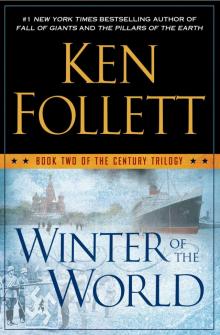 Winter of the World
Winter of the World Triple
Triple World Without End
World Without End Fall of Giants
Fall of Giants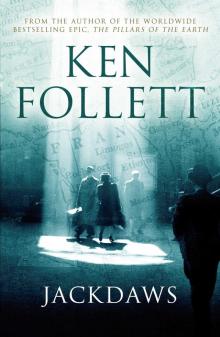 Jackdaws
Jackdaws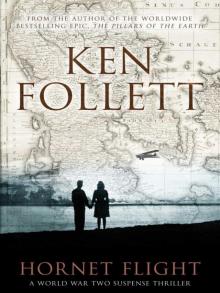 Hornet Flight
Hornet Flight Whiteout
Whiteout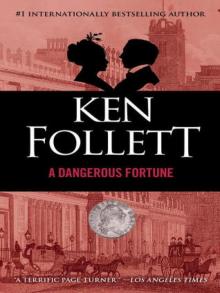 A Dangerous Fortune
A Dangerous Fortune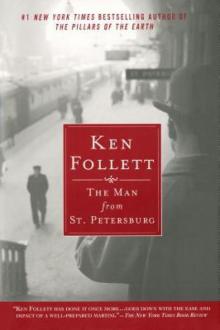 The Man From St. Petersburg
The Man From St. Petersburg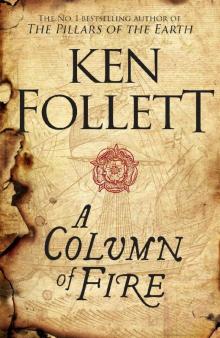 A Column of Fire
A Column of Fire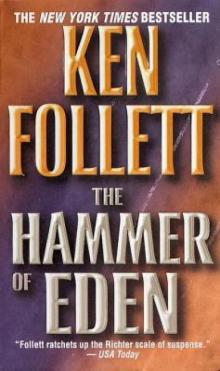 The Hammer of Eden
The Hammer of Eden On Wings of Eagles
On Wings of Eagles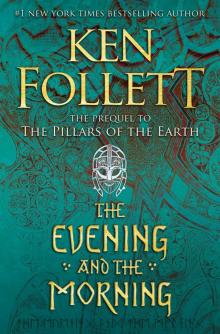 The Evening and the Morning
The Evening and the Morning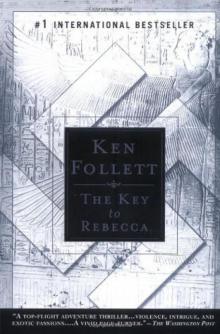 The Key to Rebecca
The Key to Rebecca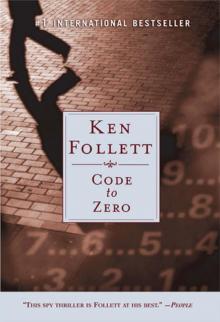 Code to Zero
Code to Zero Paper Money
Paper Money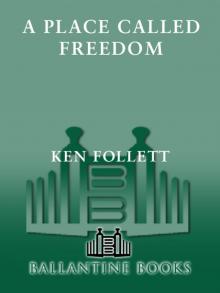 A Place Called Freedom
A Place Called Freedom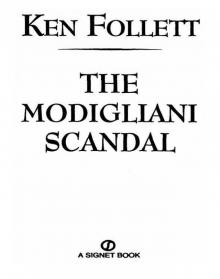 The Modigliani Scandal
The Modigliani Scandal Triple (1991)
Triple (1991)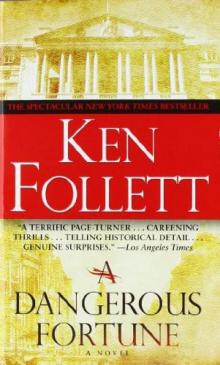 A Dangerous Fortune (1994)
A Dangerous Fortune (1994)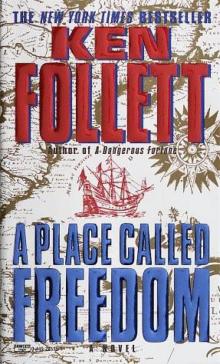 A Place Called Freedom (1995)
A Place Called Freedom (1995)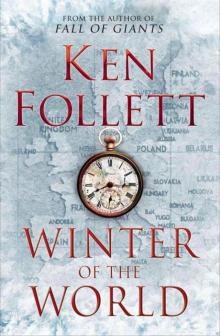 Winter of the World (Century Trilogy 2)
Winter of the World (Century Trilogy 2)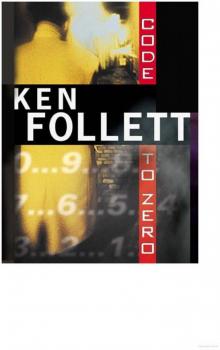 Code to Zero (2000)
Code to Zero (2000) On Wings Of Eagles (1990)
On Wings Of Eagles (1990) Storm Island
Storm Island Fall of Giants (The Century Trilogy)
Fall of Giants (The Century Trilogy)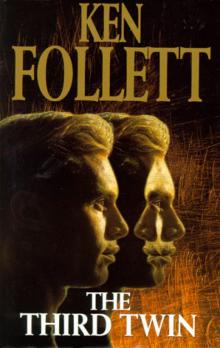 the Third Twin (1996)
the Third Twin (1996)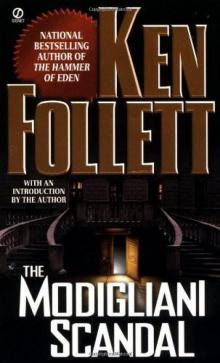 The Modigliani Scandal (1976)
The Modigliani Scandal (1976) Night Over Water
Night Over Water